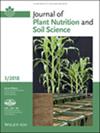生长素水平降低对缺硼玉米突变体tassel - less1发育缺陷的影响
IF 2.6
3区 农林科学
Q1 AGRONOMY
引用次数: 0
摘要
植物对微量营养素硼缺乏的反应是多种多样的,并且超出了硼在细胞壁交联中的功能。为了解释这些表型差异,人们提出了硼与各种植物激素,特别是生长素相互作用的假设。虽然这些假设在模式物种拟南芥(Arabidopsis thaliana)的根分生组织中得到了严格的检验,但对作物物种和茎的研究却很有限。为了研究玉米(Zea mays)营养和生殖发育过程中潜在的硼-生长素相互作用,我们利用缺硼tassel - less1 (tls1)突变体和缺生长素消失tassel2 (vt2)突变体。研究了硼和生长素对叶片和茎部分生组织中生长素合成和运输水平的相互作用。方法和结果通过遗传互作分析、激素定量和共聚焦显微镜,研究人员发现,在温室和田间条件下,双突变体vt2在tls1中增强了缺硼叶片表型。然而,在tls1中,生长素水平在发育中的叶片中没有改变。相反,作为生长素运输标志的Zm PIN1a:YFP的定位在年轻的雄穗分生组织中发生了改变,而在营养发育过程中器官起始部位则缺失。我们的数据表明,在缺硼条件下,极性生长素运输与表型后果之间存在联系,并进一步表明缺硼诱导的发育缺陷对低生长素水平敏感。因此,我们的研究为营养-激素相互作用调节作物发育提供了新的见解。本文章由计算机程序翻译,如有差异,请以英文原文为准。
Enhancement of developmental defects in the boron‐deficient maize mutant tassel‐less1 by reduced auxin levels
Abstract Background Plant responses to deficiencies of the micronutrient boron are diverse and go beyond the well‐characterized function of boron in cell wall crosslinking. To explain these phenotypic discrepancies, hypotheses about interactions of boron with various phytohormones have been proposed, particularly auxin. While these hypotheses are intensely tested in the root meristem of the model species, Arabidopsis thaliana , studies in crop species and the shoot are limited. Aims To address potential boron–auxin interactions during the vegetative and reproductive development of the crop maize ( Zea mays ), we utilized the boron‐deficient tassel‐less1 ( tls1 ) mutant and the auxin‐deficient vanishing tassel2 ( vt2 ) mutant. We investigated interactions of boron and auxin on the levels of auxin biosynthesis and auxin transport in leaves and shoot meristems. Methods and Results By using genetic interaction analysis, hormone quantification, and confocal microscopy, we show that boron‐deficient leaf phenotypes in tls1 are enhanced in double mutants with vt2 in both greenhouse and field conditions. However, auxin levels are not altered in developing leaves in tls1 . Rather, the localization of Zm PIN1a:YFP, a marker for auxin transport, is altered in young tassel meristems and is absent from organ initiation sites during vegetative development. Conclusions Our data suggest a link between polar auxin transport and phenotypic consequences in boron‐deficient conditions and further show that boron deficiency‐induced developmental defects are sensitive to low auxin levels. Our study, therefore, offers new insight into nutrient–hormone interactions to regulate crop development.
求助全文
通过发布文献求助,成功后即可免费获取论文全文。
去求助
来源期刊
CiteScore
4.70
自引率
8.00%
发文量
90
审稿时长
8-16 weeks
期刊介绍:
Established in 1922, the Journal of Plant Nutrition and Soil Science (JPNSS) is an international peer-reviewed journal devoted to cover the entire spectrum of plant nutrition and soil science from different scale units, e.g. agroecosystem to natural systems. With its wide scope and focus on soil-plant interactions, JPNSS is one of the leading journals on this topic. Articles in JPNSS include reviews, high-standard original papers, and short communications and represent challenging research of international significance. The Journal of Plant Nutrition and Soil Science is one of the world’s oldest journals. You can trust in a peer-reviewed journal that has been established in the plant and soil science community for almost 100 years.
Journal of Plant Nutrition and Soil Science (ISSN 1436-8730) is published in six volumes per year, by the German Societies of Plant Nutrition (DGP) and Soil Science (DBG). Furthermore, the Journal of Plant Nutrition and Soil Science (JPNSS) is a Cooperating Journal of the International Union of Soil Science (IUSS). The journal is produced by Wiley-VCH.
Topical Divisions of the Journal of Plant Nutrition and Soil Science that are receiving increasing attention are:
JPNSS – Topical Divisions
Special timely focus in interdisciplinarity:
- sustainability & critical zone science.
Soil-Plant Interactions:
- rhizosphere science & soil ecology
- pollutant cycling & plant-soil protection
- land use & climate change.
Soil Science:
- soil chemistry & soil physics
- soil biology & biogeochemistry
- soil genesis & mineralogy.
Plant Nutrition:
- plant nutritional physiology
- nutrient dynamics & soil fertility
- ecophysiological aspects of plant nutrition.

 求助内容:
求助内容: 应助结果提醒方式:
应助结果提醒方式:


